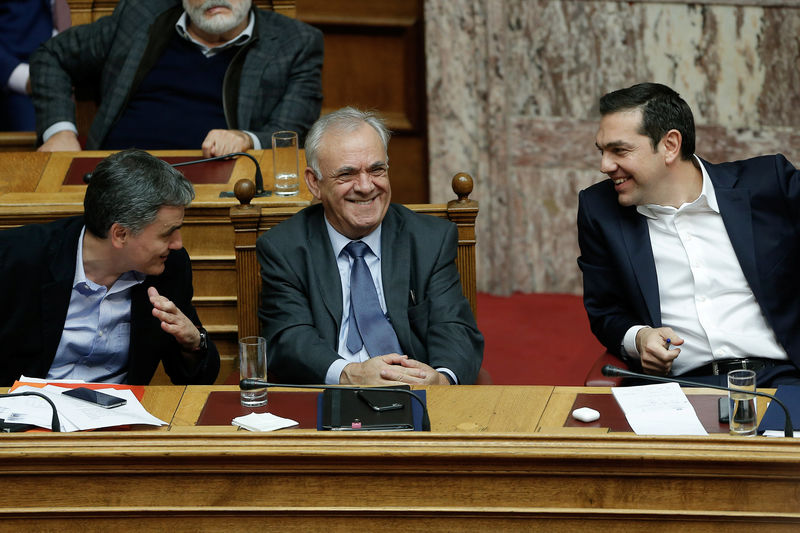 © Reuters. Greek Prime Minister Alexis Tsipras, Deputy Prime Minister Yannis Dragasakis and Finance Minister Euclid Tsakalotos talk during a parliamentary session before a budget vote in Athens
© Reuters. Greek Prime Minister Alexis Tsipras, Deputy Prime Minister Yannis Dragasakis and Finance Minister Euclid Tsakalotos talk during a parliamentary session before a budget vote in AthensBy Lefteris Papadimas
ATHENS (Reuters) – Greek lawmakers on Tuesday approved by majority the country’s 2018 budget, which the government said would be the last under bailout terms which have held the country in a stranglehold of austerity for eight years.
“We leave behind a period that no one wants to remember,” Prime Minister Alexis Tsipras told lawmakers at the end of a two-day debate in which his governing coalition were lambasted by opposition lawmakers for a tax blitz on the populace.
“For the first time, we know with certainty that this is the last bailout budget,” he added.
Greece has relied on financial handouts from European Union creditors and the International Monetary fund since 2010. Its third bailout expires in August 2018, by which time it will be expected to finance itself from the markets.
Its economy lost about a third of output over a seven-year period but is gradually returning to growth.
The budget forecasts an expansion in output of 2.5 percent in 2018, compared to a projected 1.6 percent this year. It is expected to generate a primary surplus, which excludes debt servicing, of 3.82 percent of gross domestic output, higher than that set by lenders.
Greece’s fiscal goals have been approved by European Union lenders and the International Monetary Fund.
Under its latest bailout review, the government has agreed to cut spending further, reduce pensions, complete an evaluation of public sector staff skills and qualifications and sell coal-fired power stations. It will tighten the rules for unions to call a strike.
“Greece is the only European country under a bailout and has the lowest growth in the eurozone … people wish that this budget will be the last one of your government,” said Kyriakos Mitsotakis, leader of the opposition New Democracy party.
As part of measures to offset the impact of austerity, the finance ministry said on Tuesday that value added tax would not be increased on five islands which have received thousands of asylum seekers since Europe’s migrant crisis erupted in 2015.
Tsipras won power in 2015 on promises to end austerity but later signed up to a new 86 billion-euro bailout that ends in August. His term ends in 2019 and his Syriza party is trailing in opinion polls.
A poll by the University of Macedonia for Skai TV aired on Dec. 18 showed New Democracy’s popularity at 30 percent, 12 points ahead of Syriza. Another, conducted by Kapa Research for left-leaning newspaper Ethnos, showed New Democracy leading by 4.8 points.
Fusion Media or anyone involved with Fusion Media will not accept any liability for loss or damage as a result of reliance on the information including data, quotes, charts and buy/sell signals contained within this website. Please be fully informed regarding the risks and costs associated with trading the financial markets, it is one of the riskiest investment forms possible.
Source: Investing.com




























